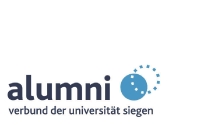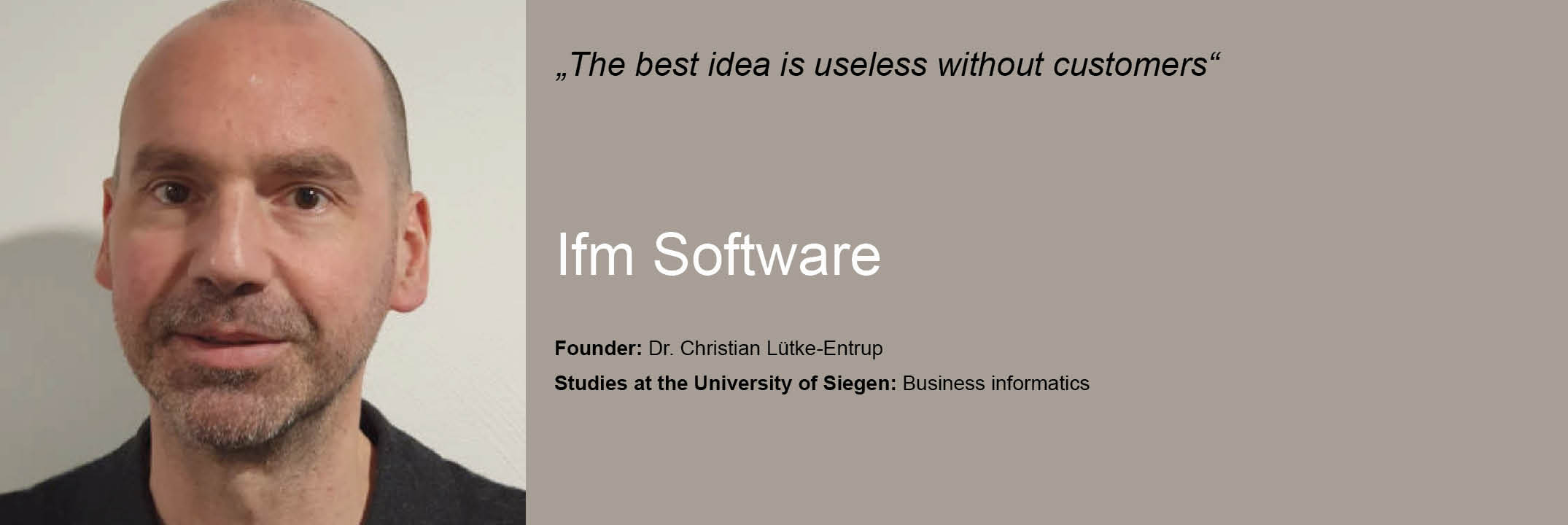Ifm Software GmbH
Dr Christian Lütke-Entrup is the founder of ifm software gmbh, where he is responsible for software development as Managing Director. With his degree in business informatics and subsequent doctorate at the University of Siegen, Christian laid the right foundations for his specialist expertise and thus for his current company at an early stage.
The ifm software gmbh develops software for industrial production processes. Various sensors generate industrial data, which is then read out and processed by software and thus provides added value. The software developed by ifm software gmbh is then distributed worldwide by the Essen-based parent company, ifm electronic gmbh. Being part of the globally operating ifm group of companies now brings both advantages and disadvantages, says the founder. They are now cogs in a large system and are relieved of many tasks, but they are also more limited in their freedom of choice.
"There is probably currently no better building here in Siegen for founders of software developments," says Christian about the Siegen Summit, where his company is also located. Originally three different software companies/software producers have now merged to form ifm software gmbh. The approximately 100 employees of ifm software gmbh today are spread across the three locations of the former individual companies (Siegen, Fürth and Zwickau).
How did you come up with the idea of founding ifm software gmbh and the associated idea of sensor specialisation/software development?
That had a lot to do with our work at the University of Siegen at the time. Business informatics at the University of Siegen was/is particularly closely linked to the industries in the Siegerland and Sauerland regions. Back then, my co-founder Julian Reichwald and I already had the idea of generating data from the machines and systems in the industries and integrating it into the business cycle. This is called Industry 4.0, so we were already very innovative. We quickly built the first prototypes, which we also enjoyed. We saw potential in it, then in 2008 we wrote our business plan and applied for the EXIST start-up grant and in 2009 we took the whole thing to the start-up stage.
What attracted you to setting up your own company?
Back in 2002, I worked as a freelance software developer for several years alongside my studies and doctorate. I particularly enjoyed this because you can be your own boss and the subject of software was always exciting for me anyway. So I have continued to pursue my passion for software development to this day, so to speak, and to benefit from the attractions of self-employment, which I already knew from freelancing.
When did you decide to set up your own company?
I got to know my co-founder Julian Reichwald during my doctoral thesis at university. Julian was also working on his doctorate in business informatics at the time. With the same professional background and complementary ideas, we both developed our first thoughts/reflections in 2007, which led to the founding of ifm in 2009. After we received the start-up grant in 2008, the decision to found the company was easier to make. As we were financially secure and could start up relatively risk-free, we decided to give it a try. Unfortunately, Julian Reichwald has no longer been involved in the company since 2012/13.
What is/was innovative about your company?
The idea was to interlink industrial production with modern IT and software systems, i.e. what is now known as Industry 4.0. The idea of using various automation technologies to optimise value creation processes in the field of industrial production was highly innovative at the time we were founded.
What was the biggest challenge you faced at ifm?
One example I can give for myself is sales. I am a rather technical person and totally underestimated the task of sales. Without customers, even the best idea is useless. It was a tough realisation process to understand that customers don't wait for you, but that you have to go there and convince them. I learnt that.
To what extent did the university's start-up office support you?
The support from the start-up office was absolutely invaluable. I don't think we would have got the grant without Frank Ermert's support. Thanks to the start-up office, we also had our office in the Artur-Woll-Haus. The coaching programmes are also very good and highly recommended. It was a very good collaboration.
What is your advice for young founders?
Customers are the most important thing. No matter how good a product idea is, it can fail mercilessly if you forget to take your customers with you. You must never forget to talk and discuss with customers on an ongoing basis. Are we on the right track? Is this what the customer really wants, or is it just what I think? Sales is an important central element alongside the product itself.
And I also advise you never to lose focus, otherwise you will quickly get bogged down. You should always work in a focussed manner, create a strategy, stick to it and constantly check yourself.
Would you set up a company again?
In any case. When I look at where I have ended up in the meantime, it makes me proud and I have no regrets. It's also a lot of fun to start up.
This portrait is based on an interview with Christian Lütke-Entrup in July 2020 and was written by Janice Gust.
Click here for the start-up's homepage.


